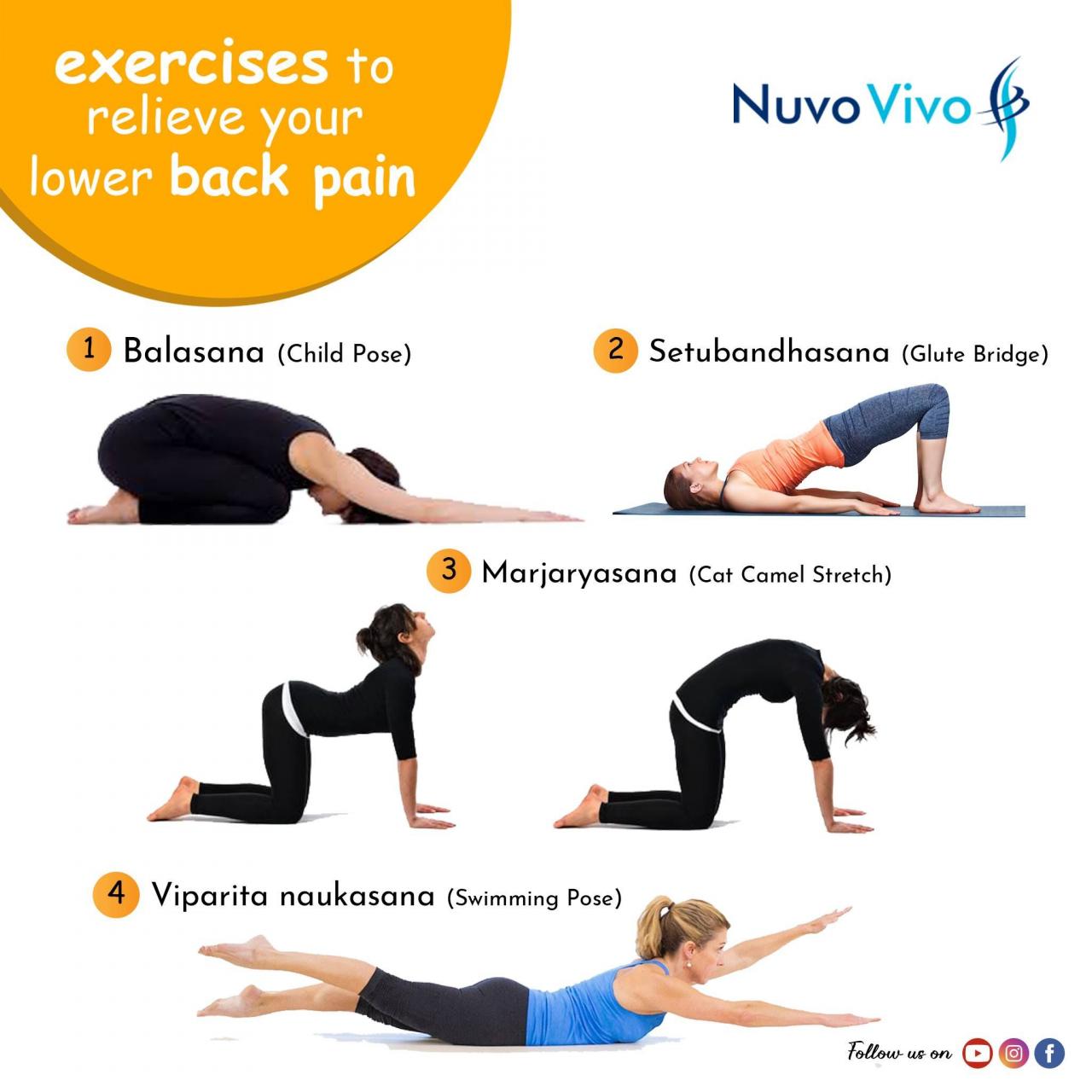
Lower back pain is a common problem that can affect people of all ages. It can be caused by a variety of factors, including muscle strain, injury, or arthritis. While there are a number of treatment options available, exercises to relieve lower back pain are often an effective and safe way to manage the condition.
This guide will provide you with a comprehensive overview of exercises to relieve lower back pain. We’ll discuss the different types of exercises that can be helpful, as well as how to perform them correctly. We’ll also provide tips on how to prevent lower back pain from recurring.
Understanding Lower Back Pain
Lower back pain is a common problem that can affect people of all ages. It can be caused by a variety of factors, including muscle strains, ligament sprains, and herniated discs. The pain can range from mild to severe, and it can make it difficult to perform everyday activities.
Common Causes of Lower Back Pain
- Muscle strains
- Ligament sprains
- Herniated discs
- Osteoarthritis
- Sciatica
Types of Lower Back Pain
- Acute lower back pain: This type of pain usually develops suddenly and lasts for less than 6 weeks. It is often caused by a muscle strain or ligament sprain.
- Subacute lower back pain: This type of pain lasts for 6 to 12 weeks. It is often caused by a herniated disc or osteoarthritis.
- Chronic lower back pain: This type of pain lasts for more than 12 weeks. It can be caused by a variety of factors, including osteoarthritis, sciatica, and spinal stenosis.
Risk Factors for Developing Lower Back Pain
- Age: The risk of developing lower back pain increases with age.
- Obesity: People who are overweight or obese are more likely to develop lower back pain.
- Occupation: People who work in jobs that require them to lift heavy objects or sit for long periods of time are more likely to develop lower back pain.
- Smoking: Smoking can damage the discs in the spine, which can lead to lower back pain.
- Poor posture: Poor posture can put strain on the muscles and ligaments in the back, which can lead to lower back pain.
Exercises to Relieve Lower Back Pain

There are a number of exercises that can help to relieve lower back pain. These exercises can help to strengthen the muscles and ligaments in the back, and they can also help to improve flexibility and range of motion.
Back muscles, essential for posture and movement, can be strengthened through targeted exercises. Learn more about these crucial muscles and how to effectively train them: back muscles . Additionally, combat lower back fat with proven exercises designed to sculpt and tone the area: exercises for lower back fat .
Benefits of Exercise for Lower Back Pain
- Strengthens the muscles and ligaments in the back
- Improves flexibility and range of motion
- Reduces pain and inflammation
- Improves posture
- Prevents future episodes of lower back pain
Exercises for Lower Back Pain
- Pelvic tilts: This exercise helps to strengthen the muscles in the lower back and abdomen. To do a pelvic tilt, lie on your back with your knees bent and your feet flat on the floor. Tilt your pelvis up so that your lower back presses into the floor.
Hold for 5 seconds and then release.
- Bridge: This exercise helps to strengthen the muscles in the buttocks and lower back. To do a bridge, lie on your back with your knees bent and your feet flat on the floor. Lift your hips up so that your body forms a straight line from your shoulders to your knees.
Hold for 5 seconds and then lower.
- Knee-to-chest stretch: This exercise helps to stretch the muscles in the lower back and hamstrings. To do a knee-to-chest stretch, lie on your back with your knees bent and your feet flat on the floor. Bring one knee to your chest and hold for 30 seconds.
Then, lower your leg and repeat with the other leg.
- Hamstring stretch: This exercise helps to stretch the muscles in the hamstrings. To do a hamstring stretch, stand with your feet shoulder-width apart. Bend over at the waist and reach your arms towards your toes. Hold for 30 seconds and then release.
Other Treatment Options for Lower Back Pain

In addition to exercise, there are a number of other treatment options for lower back pain. These treatments can include:
Heat or Cold Therapy
Heat or cold therapy can help to reduce pain and inflammation. Heat can be applied to the lower back using a heating pad or a hot water bottle. Cold can be applied to the lower back using an ice pack or a cold compress.
Massage Therapy
Massage therapy can help to relax the muscles in the lower back and relieve pain. Massage can be done by a massage therapist or by using a self-massage tool.
Elevate your fitness routine with effective lower back exercises that can be conveniently performed at home. Discover a range of movements to strengthen and stabilize this vital area: lower back exercises at home . Celebrate the special bond of motherhood with heartfelt happy mother’s day sis messages and express your gratitude with a gallery of happy mothers day wishes for all moms images .
Acupuncture, Exercises to relieve lower back pain
Acupuncture is a traditional Chinese medicine technique that involves inserting thin needles into the skin at specific points on the body. Acupuncture can help to relieve pain and inflammation in the lower back.
Medication
There are a number of medications that can be used to treat lower back pain. These medications include over-the-counter pain relievers, such as ibuprofen and acetaminophen, and prescription medications, such as opioids and muscle relaxants.
Prevention of Lower Back Pain

There are a number of things you can do to prevent lower back pain, including:
Maintain a Healthy Weight
Being overweight or obese puts strain on the muscles and ligaments in the back, which can lead to lower back pain. Maintaining a healthy weight can help to reduce your risk of developing lower back pain.
Exercise Regularly
Regular exercise can help to strengthen the muscles and ligaments in the back, which can help to prevent lower back pain. Exercise can also help to improve flexibility and range of motion, which can reduce your risk of injury.
Use Proper Posture
Poor posture can put strain on the muscles and ligaments in the back, which can lead to lower back pain. Using proper posture can help to reduce your risk of developing lower back pain.
Avoid Heavy Lifting
Lifting heavy objects can put strain on the muscles and ligaments in the back, which can lead to lower back pain. Avoid lifting heavy objects if possible. If you must lift a heavy object, be sure to use proper lifting techniques.
Outcome Summary

If you’re experiencing lower back pain, talk to your doctor to determine the best course of treatment. Exercises to relieve lower back pain can be an effective way to manage the condition, but they may not be appropriate for everyone.
If you’re looking to strengthen your back muscles , there are a variety of exercises you can do at home. One effective option is the lower back extension, which targets the muscles in your lower back. To perform this exercise, lie on your stomach with your hands under your shoulders.
Lift your legs and chest off the ground, keeping your lower back pressed against the floor. Hold for a few seconds, then slowly lower back down.
Your doctor can help you develop an exercise plan that is safe and effective for you.
FAQ: Exercises To Relieve Lower Back Pain
What are the most common causes of lower back pain?
The most common causes of lower back pain include muscle strain, injury, and arthritis.
What are the different types of exercises that can help relieve lower back pain?
There are a variety of exercises that can help relieve lower back pain, including stretches, strengthening exercises, and core exercises.
How often should I do exercises to relieve lower back pain?
The frequency of your exercise routine will depend on the severity of your pain. If you’re experiencing severe pain, you may need to do exercises several times a day. If your pain is less severe, you may only need to do exercises a few times a week.





